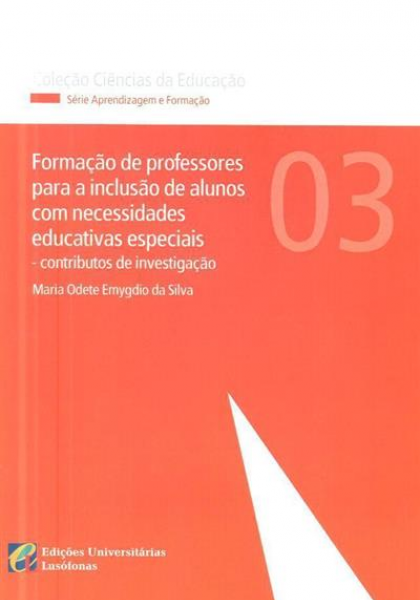Série Aprendizagem e Formação
Formação de professores para a inclusão de alunos com necessidades educativas especiais – contributos de investigação

- Maria Odete Emygdio da Silva
- Authors, Editors
- 2016
- Year of edition
- 978-989-757-028-5
- ISBN
Sinopse – [Teacher Training for the Inclusion of Students with Special Educational Needs – Research Contributions].
This work aimed to reflect on the contribution to teacher training from research conducted in Master's programs in Education Sciences, held in the state of Rio Grande do Norte, Brazil, in Visual Arts Education in the district of Lisbon, and in Special Education in the districts of Setúbal and Portalegre. Its objectives also include disseminating the research conducted.
Carried out within the scope of case studies, the studies in Education Sciences (3) and in Visual Arts Education (4) analyzed attitudes, difficulties, and strategies resulting from the inclusion of people with special needs. The research instruments used were documentary research, field notes, and semi-directive interviews, involving a total of 47 subjects. The results showed attitudes that were not very conducive to the inclusion of these individuals on the part of educational agents and employers, contrary to the importance and satisfaction attributed to it by these students, guardians, and young people entering the job market. There were conceptual difficulties regarding inclusion and operational difficulties regarding its implementation by teachers and trainers. Additionally, strategies for facilitating interaction among all students in the class and the inclusion of those with more difficulties were found to be lacking.
The action research projects (7), carried out as part of the Master's program in Special Education, used documentary research, interviews, naturalistic observation, sociometry, and field notes as instruments. Strategies included individual support for the student(s), implementing pair and group work within the classroom context through planned activities, creating objective assessment records, disseminating the work to the school, the students' families, and in some cases, the community. It was concluded that students with special educational needs, when working together with their classmates according to their abilities, had developed skills and, in some cases, had achieved significant learning. The interaction had been beneficial for everyone and had not hindered program compliance. The involvement of the guardians of students with special educational needs was found to be fundamental to the process. However, it was also noted that there is still a long way to go regarding the inclusion of these students.
The case study allowed understanding how the inclusion of students and young people with special needs is unfolding in the contexts where the research took place, and the action research projects confirmed the importance of this process for teacher training.


